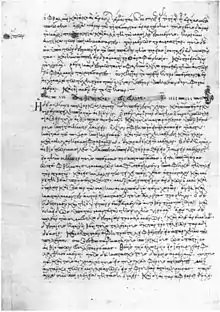Heliodorus of Emesa
Heliodorus Emesenus or Heliodorus of Emesa (Ancient Greek: Ἡλιόδωρος ὁ Ἐμεσηνός) is the author of the ancient Greek novel called the Aethiopica (Αἰθιοπικά) or Theagenes and Chariclea (Θεαγένης καὶ Χαρίκλεια), which has been dated to the 220s or 370s AD.[1]

Identification
He identifies himself at the end of his work as
a Phoenician from Emesa [modern Homs, Syria], of the line of Helios [also translated as: 'from the race of the sun'[2]], Theodosius' son Heliodorus[3]
According to Tim Whitmarsh, 'from the race of the sun' "looks like a claim to hereditary priesthood," though "uncertainties" remain.[2] According to The Cambridge History of Classical Literature, "the personal link here established between the writer and Helios has also a literary purpose, as has Calasiris' flashback narrative"[3] . The later tradition maintaining that Heliodorus had become a Christian bishop is likely fictional.[2][lower-alpha 1]
Quoting Richard L. Hunter,
The Emesenes were a culturally complex group, including Arab, Phoenician and Greek elements, and, since the third century at any rate, having a connection with the Roman imperial household (the empress Julia Domna was from Emesa, as was the cult of Elagabal which inspired the emperor Heliogabalus).[5]
See also
Other ancient Greek novelists:
- Chariton – The Loves of Chaereas and Callirhoe
- Xenophon of Ephesus – The Ephesian Tale
- Achilles Tatius – Leucippe and Clitophon
- Longus – Daphnis and Chloe
Notes
- The 5th-century Socrates of Constantinople identifies the author of the Aethiopica with a Heliodorus, bishop of Trikka, but the name Heliodorus was a common one. In the 14th century, Nikephoros Kallistos Xanthopoulos expanded this narrative, relating that the work was written in the early years of this bishop before he became a Christian and that, when forced either to disown it or resign his bishopric, he preferred resignation. Most scholars reject this identification.[4]
References
- Lane Fox, Robin (1989). Pagans and Christians. p. 118.
- Whitmarsh, Tim (2008). The Cambridge Companion to the Greek and Roman Novel. p. 72.
- The Cambridge History of Classical Literature. 1, part 4. 1993 [1985]. p. 136. ISBN 0521359848.
- Holzberg, Niklas. The Ancient Novel. 1995. p. 78; Bowersock, Glanwill W. The Aethiopica of Heliodorus and the Historia Augusta. In: Historiae Augustae Colloquia n.s. 2, Colloquium Genevense 1991. p. 43. In Historiae Augustae Colloquium Genevense, 1991; Wright, F.A. Introduction to Aethiopica., n.d.; Glenn Most, "Allegory and narrative in Heliodorus," in Simon Swain, Stephen Harrison, Jas Elsner (eds.), Severan Culture (Cambridge, Cambridge University Press, 2007).
- Hunter, Richard L. Hunter (1998). Studies in Heliodorus. p. 97.
 This article incorporates text from a publication now in the public domain: Chisholm, Hugh, ed. (1911). "Heliodorus". Encyclopædia Britannica. 13 (11th ed.). Cambridge University Press. p. 223.
This article incorporates text from a publication now in the public domain: Chisholm, Hugh, ed. (1911). "Heliodorus". Encyclopædia Britannica. 13 (11th ed.). Cambridge University Press. p. 223.